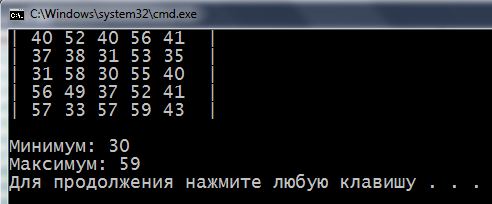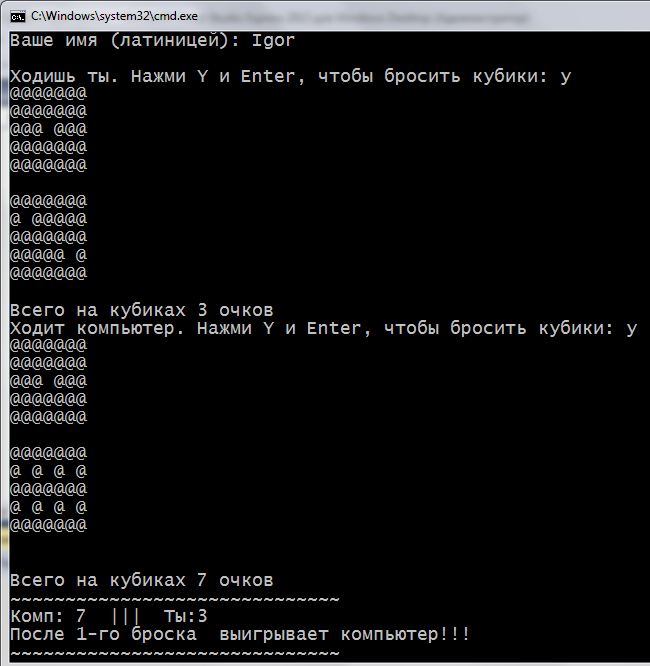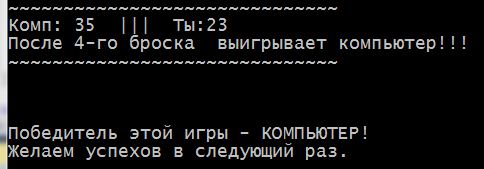Continuing to acquaint you withфункциями в C offerindependently several tasks. Расположены они по уровню сложности.
1. Объявить два целочисленных array with different sizes and write function, that fills their elements and values shown on the screen. Функция должна принимать два параметра – массив и его размер.
1 2 3 4 5 6 7 8 9 10 11 12 13 14 15 16 17 18 19 20 21 22 23 24 25 26 27 28 | #include <iostream> using namespace std; void fillAndShowArray(int arrayForFilling[], int size); int main() { const int SIZE1 = 8; const int SIZE2 = 14; int arrayForFilling1 [SIZE1] = {}; int arrayForFilling2 [SIZE2] = {}; fillAndShowArray(arrayForFilling1, SIZE1); fillAndShowArray(arrayForFilling2, SIZE2); return 0; } void fillAndShowArray(int arrayForFilling[], int size) { for (int i = 0; i < size; i++) { arrayForFilling[i] = i + 1; cout << arrayForFilling[i] << " "; } cout << endl; } |
В этой задаче удобно то, что если необходимо изменить значение размера массива, достаточно изменить соответствующую константу (SIZE1 или SIZE2). Так нам не придется менять эти значения ни в объявлении массивов, no parameters in the function call.
Отдельно хочется сказать о передаче в функцию массива, as a parameter. Мы говорили в уроке, что при вызове функции создаются точные копии переменных и все изменения происходят именно с этими копиями, а не с переменными. Так что при выходе из функции, переменные не изменят свое значение. Если всё же надо изменить значение переменных в функции – делается это с помощью ссылок or указателей, которые мы рассмотрим в следующих уроках. With the array is not the case. Everything that happens with the array elements in the function, сохраняется и после выхода из неё. Это происходит потому, что имя массива – это и есть указатель на его первый элемент.
Когда необходимо передать в функцию одномерный массив, при её определении надо указать пустые [ ] скобки после имени параметра, обозначающего массив. В нашей задаче – void fillAndShowArray(int arrayForFilling[], int size) . Если надо передать двумерный массив – the first square brackets left empty, а во вторые надо внести значение. For example void fillAndShowArray(int arrayForFilling[][3], int size)
Чтобы передать в функцию массив, при её вызове – enough to use the array name. Скобки и размер писать не надо (strings 14 – 15).
2. Необходимо создать двумерный массив 5 х 5. Далее написать функцию, which fills its random numbers from 30 to 60. Создать еще две функции, которые находят максимальный и минимальный элементы этого двумерного массива. (ABOUTгенерации случайных чисел a separate article)
1 2 3 4 5 6 7 8 9 10 11 12 13 14 15 16 17 18 19 20 21 22 23 24 25 26 27 28 29 30 31 32 33 34 35 36 37 38 39 40 41 42 43 44 45 46 47 48 49 50 51 52 53 54 55 56 57 58 59 60 61 62 63 64 65 66 67 68 69 | #include <iostream> #include <ctime> #include <cstdlib> using namespace std; const int SIZE = 5; void fillAndShowArray(int[][SIZE], const int size); int findMinElement(int[][SIZE], const int size); int findMaxElement(int[][SIZE], const int size); int main() { setlocale(LC_ALL, "rus"); int matrix[SIZE][SIZE] = {}; fillAndShowArray(matrix, SIZE); //заполняем и показываем массив cout << endl; cout << "Минимум: " << findMinElement(matrix, SIZE) << endl; cout << "Максимум: " << findMaxElement(matrix, SIZE) << endl; return 0; } void fillAndShowArray(int arr[][SIZE], const int size) { for (int i = 0; i < size; i++) { cout << "| "; for (int j = 0; j < size; j++) { arr[i][j] = 30 + rand() % 31; cout << arr[i][j] << " "; } cout << " |" << endl; } } int findMinElement(int arr[][SIZE], const int size) { int min = arr[0][0]; for (int i = 0; i < size; i++) { for (int j = 0; j < size; j++) { if (arr[i][j] < min) min = arr[i][j]; } } return min; } int findMaxElement(int arr[][SIZE], const int size) { int max = arr[0][0]; for (int i = 0; i < size; i++) { for (int j = 0; j < size; j++) { if (arr[i][j] > max) max = arr[i][j]; } } return max; } |
Чтобы найти минимальное значение в массиве, first assign a variablemin, которая определена в функции findMinElement(), cell valuearr[0][0]: int min = arr[0][0]; . Потом проходим по всем ячейкам двумерного массива. Если встретим значение меньше того, которое было записано в min at the beginning – перезаписываем эту переменную. Максимальное значение определяется похожим образом.
Программа работает так:
3. Написать игру в которой имитируется бросание кубиков компьютером и пользователем. В игре 2 dice and each of them may fall from 1 to 6 очков. Реализовать определение программой первого ходящего. Каждый делает по четыре броска. After the shots show, нарисованные символами кубики и количество очков, выпавших на них. After a couple of shots (бросок компьютера + бросок пользователя) display the intermediate result– the number of the player and the computer score. After announce, who won on the basis of all the shots.
1 2 3 4 5 6 7 8 9 10 11 12 13 14 15 16 17 18 19 20 21 22 23 24 25 26 27 28 29 30 31 32 33 34 35 36 37 38 39 40 41 42 43 44 45 46 47 48 49 50 51 52 53 54 55 56 57 58 59 60 61 62 63 64 65 66 67 68 69 70 71 72 73 74 75 76 77 78 79 80 81 82 83 84 85 86 87 88 89 90 91 92 93 94 95 96 97 98 99 100 101 102 103 104 105 106 107 108 109 110 111 112 113 114 115 116 117 118 119 120 121 122 123 124 125 126 127 128 129 130 131 132 133 134 135 136 137 138 139 140 141 142 143 144 145 146 147 148 149 150 151 152 153 154 | #include <iostream> #include <ctime> #include <cstdlib> using namespace std; bool calcFirstMove(); void drowCube(int res); int computerOrPlayerThrow(); void showIntermediateResult(int pointsOfComputer, int pointsOfUser, int numberThrow); int main() { setlocale(LC_ALL, "rus"); srand(time(NULL)); int playerScore = 0; // для накопления очков int computerScore = 0; int whoMove = 0; char userName[16] = {}; cout << "Ваше имя (латиницей): "; cin >> userName; whoMove = calcFirstMove(); // если будет 0 - ходит игрок, 1 - ходит компьютер for (int i = 0; i < 4; ++i) { for (int j = 0; j < 2; j++) { if (whoMove) { cout << "\nХодишь ты. "; playerScore += computerOrPlayerThrow(); } else { cout << "\nХодит компьютер. "; computerScore += computerOrPlayerThrow(); } whoMove = !whoMove; // инверсия } showIntermediateResult(computerScore, playerScore, i); } if (computerScore > playerScore) { cout << "\n\nПобедитель этой игры - КОМПЬЮТЕР\n!"; cout << "Желаем успехов в следующий раз.\a\a\a\a\a\n\n"; } else if (computerScore < playerScore) { cout << "\n\nПобедитель этой игры - " << userName << "!!! "; cout << "Поздравляем!!!\a\a\a\a\a\n\n"; } else { cout << "\n\nВ этой игре НИЧЬЯ\a\a\a\a\a\n\n"; } return 0; } bool calcFirstMove() // генерирует и возвращает случайное число 0 или 1 { return rand() % 2; } void showIntermediateResult(int computerScore, int playerScore, int numberThrow) { cout << "\n~~~~~~~~~~~~~~~~~~~~~~~~~~~~~~\n"; cout << "Комп: " << computerScore << " ||| Ты:" << playerScore << endl; cout << "После " << numberThrow + 1 << "-го броска "; if (computerScore > playerScore) cout << " выигрывает компьютер!!!\n"; else if (computerScore < playerScore) cout << " выигрываете Вы!!!\n"; else cout << " ничья!!!\n"; cout << "~~~~~~~~~~~~~~~~~~~~~~~~~~~~~~\n\n"; } // вызывается в функции computerOrPlayerThrow() void drowCube(int res) { switch (res) { case 1: cout << "@@@@@@@\n"; cout << "@@@@@@@\n"; cout << "@@@ @@@\n"; cout << "@@@@@@@\n"; cout << "@@@@@@@\n"; break; case 2: cout << "@@@@@@@\n"; cout << "@ @@@@@\n"; cout << "@@@@@@@\n"; cout << "@@@@@ @\n"; cout << "@@@@@@@\n"; break; case 3: cout << "@@@@@@@\n"; cout << "@ @@@@@\n"; cout << "@@@ @@@\n"; cout << "@@@@@ @\n"; cout << "@@@@@@@\n"; break; case 4: cout << "@@@@@@@\n"; cout << "@ @@@ @\n"; cout << "@@@@@@@\n"; cout << "@ @@@ @\n"; cout << "@@@@@@@\n"; break; case 5: cout << "@@@@@@@\n"; cout << "@ @@@ @\n"; cout << "@@@ @@@\n"; cout << "@ @@@ @\n"; cout << "@@@@@@@\n"; break; case 6: cout << "@@@@@@@\n"; cout << "@ @ @ @\n"; cout << "@@@@@@@\n"; cout << "@ @ @ @\n"; cout << "@@@@@@@\n\n"; break; } } int computerOrPlayerThrow() // реализация броска пары кубиков и возврат полученных очков { int result = 0; char c = 0; cout << "Нажми Y и Enter, чтобы бросить кубики: "; do { cin.sync(); // очистка буфера cin >> c; } while (c != 'y' && c != 'Y'); int tmp = 0; // для накопления очков пары брошенных кубиков for (int i = 0; i < 2; ++i) { tmp = 1 + rand() % 6; drowCube(tmp); result += tmp; cout << endl; } cout << "Всего на кубиках " << result << " очков"; return result; } |
Комментарии к исходному коду: Определяем прототипы в строках 7 – 10. In string 25 in a variablewhoMove written that returns a random number functioncalcFirstMove(). Для себя определим, that if she returns 0 – ходит игрок, 1 – ходит компьютер. In strings 27 – 45 is конструкция вложенных циклов for. Во вложенном цикле (strings 29 – 42) происходит реализация поочередных бросков: учитывается, кто бросает первым, накапливаются очки, подсчитанные функцией computerOrPlayerThrow(). In string 41 changing value of variable whoMove на противоположное, для смены ходящего. The outer loop counts the number of pairs of rolls. Just in it functionshowIntermediateResult() показывает промежуточные результаты.
Определения всех функций находятся в строках 65 – 159. showIntermediateResult() принимает количество очков игрока и компьютера, после каждой пары бросков и выводит промежуточный результат. Так же функция принимает значение счетчика цикла для отображения номера броска.
drowCube() It called in the function computerOrPlayerThrow(). Она принимает результат сгенерированного в computerOrPlayerThrow() random number (from 1 to 6) и рисует соответствующий кубик.
computerOrPlayerThrow() предлагает сделать ход. Дважды генерирует число от 1 to 6 and causesdrowCube() для показа кубиков. Стандартная функция Sinksync() performs cleaning buffer – if the user has entered more than one character in the previous time.
Result:



In the first task.
One function is to solve one problem. You function fills and conclusions. correctly spelled 2 functions.
In the second problem is the same, but also… I would add a comparison function and pass it as an argument. You have the code functions findmin b findmax almost identical. This is bad.
Something like that
int find(const int *arr, const int n, const std::functoin compare) const {
int result = arr[0];
for(int i = 1; i < n; ++i)
result = compare(arr[i], result);
return result;
}
int min(int a, int b) { return a b ? a : b; }
// …
int size = 5;
int *arr = new int[size];
find(arr, size, min); // find the minimum element
Code nakidal skhemotichno.
A third problem… I have a main function broken into smaller. For example the user can make a greeting in a separate function. Why not?
third task class! He gave his younger brother to play dice with the computer ;)
Here's what happened in the 3rd mission.
void DoPlayerWalketh(int &iFirstCubeValue, int &iSecondCubeValue, int &iPlayerScore);
void DoComputerWalketh(int &iFirstCubeValue, int &iSecondCubeValue, int &iComputerScore);
void ShowResults(int iPlayerScore, int iComputerScore);
int iChooiseWalketh(int iArray);
void KickTwoCubes(int &iFirstCube, int &iSecondCube);
void cls();
void pause();
using namespace std;
bool enable(true);
int main()
{
setlocale(LC_ALL, "Russian");
int iFirstCubeValue(0), iSecondCubeValue(0);
int iPlayerScore(0), iComputerScore(0);
int iWalketh(0);
do
{
cls();
iWalketh = iChooiseWalketh(iWalketh);
if (iWalketh == 1)
{
DoPlayerWalketh(iFirstCubeValue, iSecondCubeValue, iPlayerScore);
DoComputerWalketh(iFirstCubeValue, iSecondCubeValue, iComputerScore);
ShowResults(iPlayerScore, iComputerScore);
}
else if (iWalketh == 0)
{
DoComputerWalketh(iFirstCubeValue, iSecondCubeValue, iComputerScore);
DoPlayerWalketh(iFirstCubeValue, iSecondCubeValue, iPlayerScore);
ShowResults(iPlayerScore, iComputerScore);
}
} while (enable);
_getch();
return 0;
}
void DoPlayerWalketh(int &iFirstCube, int &iSecondCube, int &iScore)
{
char chChooise('A');
cls();
cin.clear();
cin.sync();
cout << "Бросить кубик?" << endl;
cout <> chChooise;
switch (chChooise)
{
case 'y':
case 'Y':
KickTwoCubes(iFirstCube, iSecondCube);
cls();
cout << "Вы бросили кубик..." << endl;
cout << "Вам выпало: " << iFirstCube << " и " << iSecondCube << endl;
iScore += iFirstCube + iSecondCube;
pause();
break;
case 'n':
case 'N':
enable = !enable;
break;
default:
DoPlayerWalketh(iFirstCube, iSecondCube, iScore);
break;
}
}
void DoComputerWalketh(int &iFirstCube, int &iSecondCube, int &iScore)
{
if (enable)
{
cls();
cout << "Ход компьютера." << endl;
pause();
cls();
cout << "Компьютер бросил кубик..." << endl;
KickTwoCubes(iFirstCube, iSecondCube);
cout << "Ему выпало: " << iFirstCube << " и " << iSecondCube << endl;
iScore += iFirstCube + iSecondCube;
pause();
}
}
void ShowResults(int iPlayerScore, int iComputerScore)
{
if (enable)
{
cls();
cout <Результаты раунда<----------" << endl;
cout << "| Всего очков у игрока: " << iPlayerScore << endl;
cout << "| Всего очков у компьютера: " << iComputerScore << endl;
pause();
}
else
{
cls();
cout <>>Результаты и определение победителя<<<" < iComputerScore)
cout << "*Победитель - человек с " << iPlayerScore << " очками*" < iPlayerScore)
cout << "*Победитель - компьютер с " << iComputerScore << " очками*" << endl;
cout << "Общие результаты: " << endl;
cout << "Игрок: " << iPlayerScore << " очков." << endl;
cout << "Компьютер: " << iComputerScore << " очков." << endl;
pause();
}
}
void KickTwoCubes(int &iFirstCube, int &iSecondCube)
{
srand(time(NULL));
int iRandomize = rand() % 7;
for (int i(0); i < iRandomize; i++)
iFirstCube = 1 + rand() % (6 - 1 + 1);
iRandomize = rand() % 7;
for (int i(0); i < iRandomize; i++)
iSecondCube = 1 + rand() % (6 - 1 + 1);
}
int iChooiseWalketh(int iArray)
{
if (iArray == 0)
return 1;
if (iArray == 1)
return 0;
else
return 2;
}
void cls()
{
system("cls");
}
void pause()
{
system("pause");
}
However, by looking after the decision code, I understood, that in such performance more than 2 Me-ki does not shine xD
int funcmass()
{
const int size1 = 10;
const int size2 = 5;
int ms1[size1] = {};
int ms2[size2] = {};
srand(time_t(NULL));
for (int i = 0; i < size1; i )
{
ms1[i] = 1+rand()%10;
cout<<"ms1= "<< ms1[i] << endl;;
};
cout <<"——————————————————————————-";
for (int i = 0; i < size2; i )
{
ms2[i] = 1 + rand() % 5;
cout << "ms2= " << ms2[i] << endl;;
};
return 0;
}
int main()
{
setlocale(LC_ALL, "rus");
funcmass();
system("PAUSE");
return 0;
}
What's wrong with this option?
#include#include
using namespace std;
int brosok();
void kubik(int player, int comp);
void tabl(int player, int comp);
int main()
{
srand(time(NULL));
char name[15];
int player = 0;
int comp = 0;
cout < < "Добро Пожаловать" << endl; cout << name; kubik(player, comp); return 0; } int brosok() { int s, a; char y = 0; cout << y; if (y == 'y') { a = 1 + rand() % 6; s = a; } else if (y != 'y') { cout << "Не шути со мной." << endl; } cout << endl; switch (a) { case 1: cout << "@@@@@@@\n"; cout << "@@@@@@@\n"; cout << "@@@ @@@\n"; cout << "@@@@@@@\n"; cout << "@@@@@@@\n"; cout << "\nОдно очко\n"; break; case 2: cout << "@@@@@@@\n"; cout << "@ @@@@@\n"; cout << "@@@@@@@\n"; cout << "@@@@@ @\n"; cout << "@@@@@@@\n"; cout << "\nДва очка\n"; break; case 3: cout << "@@@@@@@\n"; cout << "@ @@@@@\n"; cout << "@@@ @@@\n"; cout << "@@@@@ @\n"; cout << "@@@@@@@\n"; cout << "\nТри очка\n"; break; case 4: cout << "@@@@@@@\n"; cout << "@ @@@ @\n"; cout << "@@@@@@@\n"; cout << "@ @@@ @\n"; cout << "@@@@@@@\n"; cout << "\nЧетыре очка\n"; break; case 5: cout << "@@@@@@@\n"; cout << "@ @@@ @\n"; cout << "@@@ @@@\n"; cout << "@ @@@ @\n"; cout << "@@@@@@@\n"; cout << "\nПять очков\n"; break; case 6: cout << "@@@@@@@\n"; cout << "@ @ @ @\n"; cout << "@@@@@@@\n"; cout << "@ @ @ @\n"; cout << "@@@@@@@\n\n"; cout << "\nШесть очков\n"; break; } return s; } void kubik(int player, int comp) { for (int i = 0; i < 4; i++) { cout << "\nВаш бросок, "; player = brosok(); cout << comp; } tabl(player, comp); cout << "Вы победили, поздравляем!!!" << player; tabl(player, comp); cout << "Вы проиграли, не отчаивайтесь." << endl; } void tabl(int player, int comp) { cout << "Таблица Бросков" << endl; cout << "| Вы набрали: " << player << "||" << "Компьютер набрал: " << comp << " |" << endl; cout << endl; }
The first task:
The third problem can be written in C:
int minValueArr(int Arr[][5], int SizeArr)
{
int minItem = Arr[0][0];
for (int i = 0; i < SizeArr; i )
{
for (int j = 0; j Arr[i][j])
{
minItem = Arr[i][j];
}
}
}
cout << "Наименьшее значение элементов массива = " << minItem<<endl<<endl;
return minItem;
}
How critical to use the operator “cout” in the function, or its variant is more correct to use within the function “main”, as shown in your examples. Thank you.